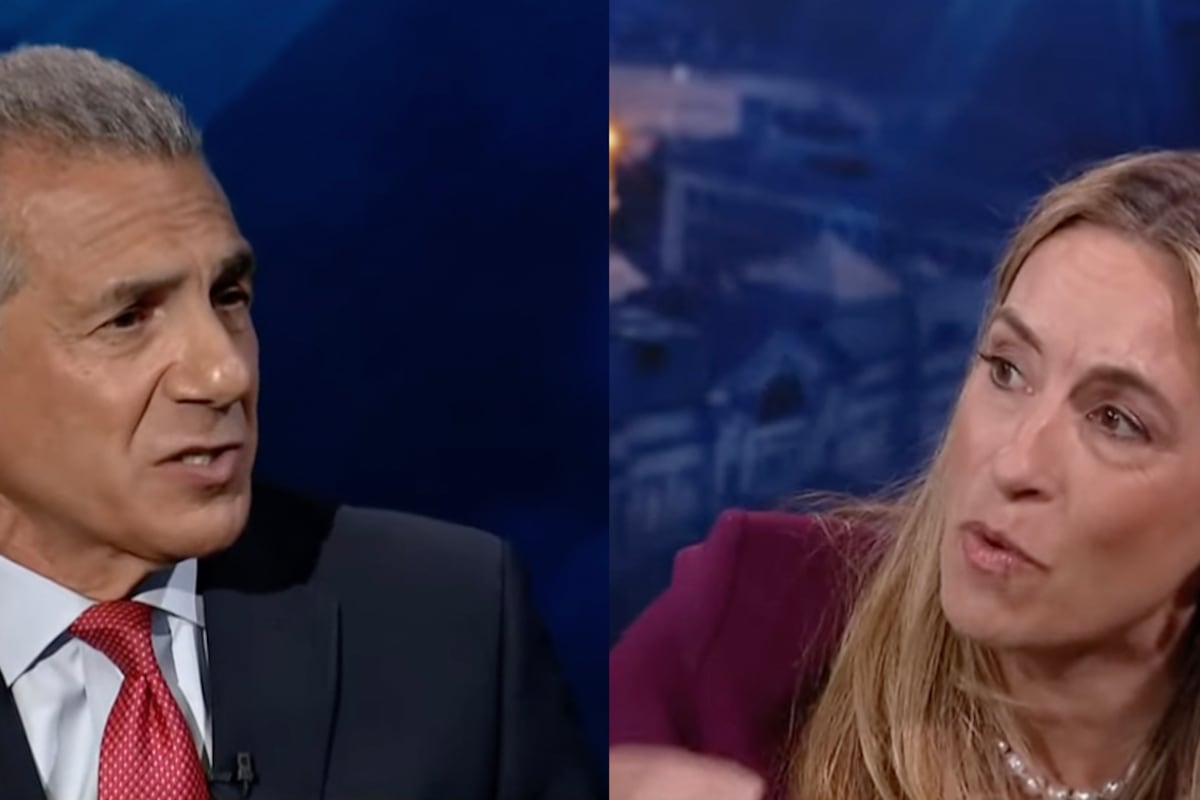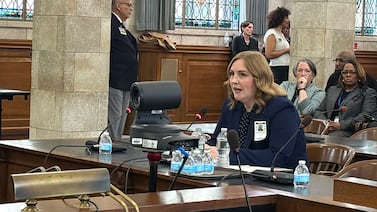Sign up for Chalkbeat Newark’s free newsletter to get the latest news about the city’s public school system delivered to your inbox.
In the election for New Jersey’s next governor, the major party candidates have diverging priorities on key local education issues, which may get overshadowed by President Donald Trump’s looming presence in the race.
The contest may also be upended by a pending lawsuit that alleges the state is responsible for fixing its racially and socioeconomically segregated public school system, which studies have found to be among the most segregated in the nation for Black and Latino students.
Democratic nominee U.S. Rep. Mikie Sherrill, whose district includes Essex County, and Republican candidate Jack Ciattarelli, a former state lawmaker, agree on a couple of areas: The state’s school funding formula needs to change and school-to-workforce programs should be expanded. But they differ in how to get there and why, and are even farther apart on other issues such as the state’s LGBTQ curriculum requirements.
For Ciattarelli, who’s endorsed by Trump, near the top of his education platform is to support charter school growth in New Jersey and to use Florida’s school voucher program as a model. For Sherrill, supporting high-quality tutoring, mental health services for students, and regional magnet schools to help address the state’s de facto segregation found in its schools are among her top priorities.
Sherrill and Ciattarelli won their respective party’s nomination in the Tuesday primary, which had the highest voter turnout in years, based on the latest unofficial primary results.
Voters selected from a pool of five candidates on the Republican side and six on the Democratic ticket, which included Newark Mayor Ras Baraka. Baraka ran a more progressive campaign to Sherill’s moderate views and received the second highest number of votes.
Gubernatorial election could make history
New Jersey’s gubernatorial election is one of two statewide elections in the country this year — Virginia, too, is electing a new governor. Political experts usually look to these races, which immediately follow a presidential election, as indicators of how voters are responding to national politics.
Considered a “blue state,” New Jersey’s roughly 2.5 million registered Democratic voters far outnumber its 1.6 million registered Republicans, but 2.4 million unaffiliated voters create unpredictability in statewide elections. In November 2024, Trump lost to former President Joe Biden by six percentage points in New Jersey, tightening the margin from his 2020 loss in the state of 16 percentage points.
The winner of this November’s election will succeed Gov. Phil Murphy, who’s in his second consecutive term, the limit set under state constitution. Not since 1970 has New Jersey elected a Democrat to the helm for more than two consecutive terms. If Sherrill wins, she would make history by becoming the first Democratic governor who’s a woman.
New Jersey is also known for having among the highest property taxes in the country and often ranked as having among the best schools, though standardized test scores show a majority of students statewide struggle to meet grade-level proficiency in reading and math.
The governor has a consequential role in laying out the state’s public education priorities and how school aid is distributed, with the authority to appoint members to the state school board and an education commissioner to lead the state’s education department.
How will candidates respond to potential federal cuts to education?
This year, federal policy may also play an outsized role in determining the education issues facing the next governor.
“In New Jersey, the cost of education in terms of taxes and the allocation, has always been a hot button issue,” said Kelly Ditmar, a political science associate professor and the research director at the Center for American Women in Politics at the Eagleton Institute at Rutgers University. “I would expect that to be true yet again this year, but with this added layer of complication given the Trump administration’s attack on public education.”
The Trump administration has taken steps to dismantle the federal Education Department and created uncertainty in state and local budgets as some federal funding for K-12 and colleges has already been cut or put at risk. A federal budget proposal for 2026, backed by Trump and making its way through Congress, would include additional cuts to social programs, public health, and preschool.
Murphy’s proposed $58.1 billion state budget, a record high spending plan, includes $22.2 billion for pre-K-12 education for fiscal year 2025-26. Political experts say there’s little to no room in the state’s budget to cover any losses from federal funding cuts.
“Neither candidate is going to want to talk about how Trump is hurting schools because then the follow-up question is, ‘What are you going to do about it?’ and the answer is, well, ‘We don’t have any solutions because we don’t have any money to fill that gap,’” said Dan Cassino, government and politics professor at Fairleigh Dickinson University and the executive director of its polling center.
School segregation case could ‘throw a bomb’ in the race
In the backdrop of this election, the state is fighting a lawsuit that alleges its public education system is racially and socioeconomically segregated due in part to longstanding residential rules that require students to attend schools in their hometown. Plaintiffs in that case, a coalition of social justice groups and families, recently filed for the case to be reviewed by the state’s appellate court. The state argued against that motion, saying the case should go back to trial court after attempts to reach a settlement in mediation failed earlier this year.
Should a judge make a consequential decision in that case within the next few months, it could be a wild card in the gubernatorial election, Cassino said.
“This has the potential to throw a bomb into this election,” he said in a phone interview on Wednesday. “We’ve got candidates who are going to do their best to talk around the issue of racial segregation in schools but that issue is going to keep coming up.”
In a voter guide published by The Jersey Bee, Sherrill was asked about school desegregation.
“I believe part of the solution should include new regional magnet schools that enroll a diverse group of students from both urban and suburban communities,” she said in her response.
On Ciattarelli’s campaign website, he mentions the state’s interdistrict public school choice program, which allows districts to opt in on a list of districts that accept students from across municipal boundaries. The program has been cited as a way to address school segregation, though Ciattarelli’s aim would be to use it as a ramp to create a private school voucher program. Those programs use public dollars to pay for a student’s private school tuition, shifting those funds from the public school district.
“Jack will expand charter schools and loosen restrictions on the interdistrict public school choice program to allow parents real choices in the schools their children attend — modeling it after Florida’s school voucher program,” the website states.
Candidates take on issue of parental rights
In recent years, under Murphy, New Jersey has adopted statewide curriculum standards that include teaching students about the historical contributions of LGBTQ people.
“Parents have a right to opt out of a lot of things but this is not an area where they should be opting out,” Sherrill, a U.S. Navy veteran, said in a primary debate when asked about whether she would support parents who want to “opt-out” their students from those lessons. “This is an area of understanding the background of people throughout our nation and right now we see, for example, in the [U.S.] Naval Academy, an erasure of history.”
In his response on a separate debate panel with the Republican candidates, Ciattarelli said, “I don’t believe we need an LGBTQ curriculum and that doesn’t mean I’m not an inclusive guy.” He added that children should be taught to “respect people and show tolerance” for people who are different from them.
Catherine Carrera is the bureau chief for Chalkbeat Newark. Contact Catherine at ccarrera@chalkbeat.org.




